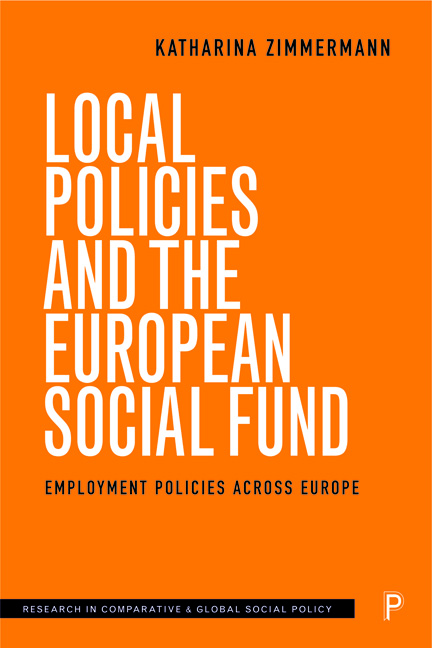Book contents
- Frontmatter
- Contents
- List of Tables and Figures
- List of Abbreviations
- Acknowledgements
- Series Preface
- 1 Introduction
- 2 Social and Employment Policies in Europe from a Multilevel Perspective
- 3 Domestic Responses to European Money: A Theoretical Perspective
- 4 The Research Programme in a Nutshell
- 5 Comparative Insights into Local Responses to the European Social Fund
- 6 What Responses Under what Conditions? Formal Qualitative Comparative Analyses and Preliminary Interpretations
- 7 Beyond Numbers: Using Case Study Insights to Support Interpretation
- 8 A Broader Perspective on Local Policies and the European Social Fund
- 9 Conclusion
- References
- Appendix: Calibration Material
- Index
5 - Comparative Insights into Local Responses to the European Social Fund
Published online by Cambridge University Press: 04 March 2021
- Frontmatter
- Contents
- List of Tables and Figures
- List of Abbreviations
- Acknowledgements
- Series Preface
- 1 Introduction
- 2 Social and Employment Policies in Europe from a Multilevel Perspective
- 3 Domestic Responses to European Money: A Theoretical Perspective
- 4 The Research Programme in a Nutshell
- 5 Comparative Insights into Local Responses to the European Social Fund
- 6 What Responses Under what Conditions? Formal Qualitative Comparative Analyses and Preliminary Interpretations
- 7 Beyond Numbers: Using Case Study Insights to Support Interpretation
- 8 A Broader Perspective on Local Policies and the European Social Fund
- 9 Conclusion
- References
- Appendix: Calibration Material
- Index
Summary
This study is interested in processes of Europeanisation at the local level brought about by the ESF. As argued in the first part of this book, Europeanisation can be understood in terms of two different dimensions: a procedural dimension and an outcome dimension. While the former refers to the process of engaging with the ESF undertaken by local actors, the latter is concerned with the effects of this engagement in terms of field change. I have termed the two dimensions of Europeanisation, in accordance with the literature, ‘usage of European resources’ and ‘EU-induced change’. These two dimensions of Europeanisation can also be understood as local responses to the ESF. From a field theoretical perspective, usage is a process of organisationally appropriating a European resource within a domestic field. When field actors make use of a resource as a reference point for their action, innovative action is taking place in the field. In a second step potentially following such usage, the transformation of the innovative action into field change might happen. This would be regarded as EU-induced change.
Against the backdrop of this analytical perspective, the aim of this study is first of all to examine what ESF-induced usage and change in local labour market policies look like empirically, and then, in a second step, to analyse the conditions under which usage and change appear. In this chapter, I address the first part of this twofold research interest and paint an empirical picture of local responses to the ESF in the 18 cases under study. As outlined above, this study's methodological approach is based on fuzzy set QCA, which requires me to transform the qualitative data into numerical fuzzy sets. A crucial task in this chapter is hence to illustrate this calibration process for the phenomenon of usage, and in a second step for the phenomenon of change. In a final step, the empirical picture of usage and change in all 18 cases under study is presented.
Using European money: descriptive discussion of the usages of the ESF
In almost all of the empirical cases under study, the usage of the ESF is widespread and very common. However, even a rough overview of the empirical data indicates that perceptions of this European funding tool and its applications differ substantially across and within countries.
- Type
- Chapter
- Information
- Local Policies and the European Social FundEmployment Policies Across Europe, pp. 61 - 80Publisher: Bristol University PressPrint publication year: 2019



